Case description
This is a reclaiming motion (appeal) from a decision of the Lord Ordinary finding that a decision of the Scottish Ministers to vary the conditions attached to a fishing licence was unlawful.
Under the Fisheries Act 2020, the Ministers have power to grant fishing licences for Scottish vessels, or for foreign vessels fishing in Scottish waters. The Ministers may attach conditions to a licence and may vary those conditions. The variation of conditions is a routine matter, for example the Ministers may periodically adjust the catch limits for certain species of fish, or impose variations to take account of regulatory change. On a day-to-day basis, licensing decisions are made by Marine Scotland, the directorate of the Scottish government with overall responsibility for the management of Scottish waters.
The Marine (Scotland) Act 2010 introduced the concept of marine planning. The Act requires the Ministers to produce a national plan for Scottish waters to ensure that marine activity is sustainable. Scotland’s National Marine Plan was produced in 2015. The NMP includes a number of policies which apply to all development and use of inshore and offshore waters. Policy GEN 9 concerns natural heritage and provides that “development and use of the marine environment must…(b) not result in significant impact on the national status of Priority Marine Features.” PMFs are species and habitats which have been identified as being of conservation importance to Scotland.
At the heart of the petitioners’ case lies the submission that section 15 of the 2010 Act requires the Ministers to make any decision regarding the grant or variation of the conditions attached to a sea fishing licence in accordance with the policies of the NMP.
On 30 December 2022, the Ministers varied the conditions applicable to all Scottish sea fishing licences. In doing so, they did not consider the NMP. Among other matters, the variations concerned certain conditions applicable to the fishing of nephrops (a type of lobster), which can be carried out by means of bottom trawling, and scallop dredging. The variations did not make those fishing methods legal; both were already legal activities prior to the issue of the notice. Rather, the variations simply imposed certain conditions on the fishing of nephrops and scallops, i.e. a 65 day limit on scallop dredging in certain areas during the first quarter of 2023, and a 20 tonne nephrop catch limit in certain areas during that same period.
The Ministers do not agree that section 15 requires them to consider the NMP when varying the conditions. They submit that it would be impractical for them to do so and that, in any event, they are fulfilling their obligations under the NMP by implementing relevant secondary legislation. They contend that they did not need to consider the NMP when making the variation decision and therefore did not do so. The petitioners contend that dredging and trawling are likely to create a significant impact on the national status of PMFs in the areas where such methods of fishing are used and that the conditions allowing them are contrary to policy GEN 9(b). They sought declarator that the aspects of the notice which related to fishing for nephrops and scallop dredging were unlawful because they had been issued without consideration of the NMP and contrary to section 15.
The Lord Ordinary agreed with the petitioners’ interpretation of section 15. Standing the Ministers’ admission that they had not considered the NMP, he granted declarator that the notice of 30 December 2022 insofar as it related to nephrops and scallops was unlawful. The Ministers appeal this decision. The First Division will hear the appeal on Wednesday 20 March 2024.

